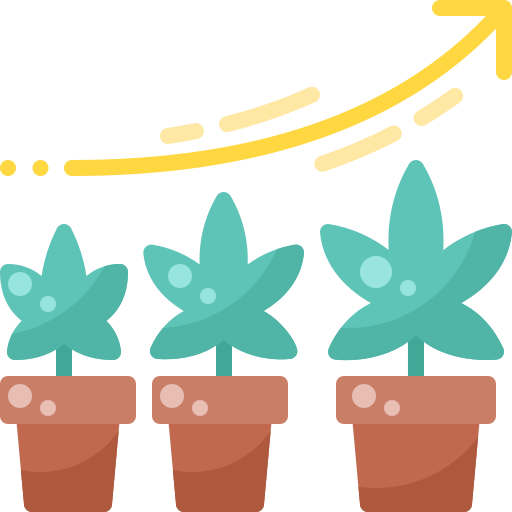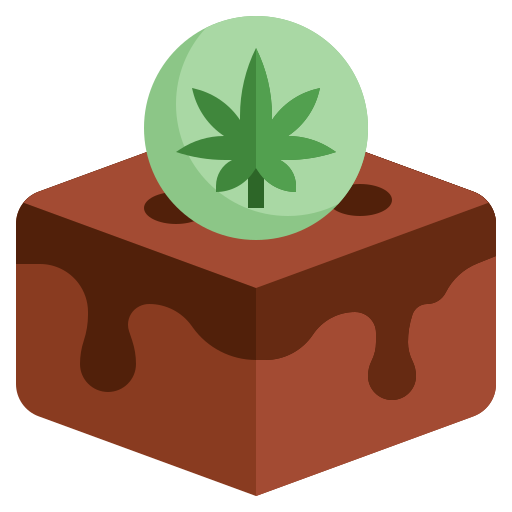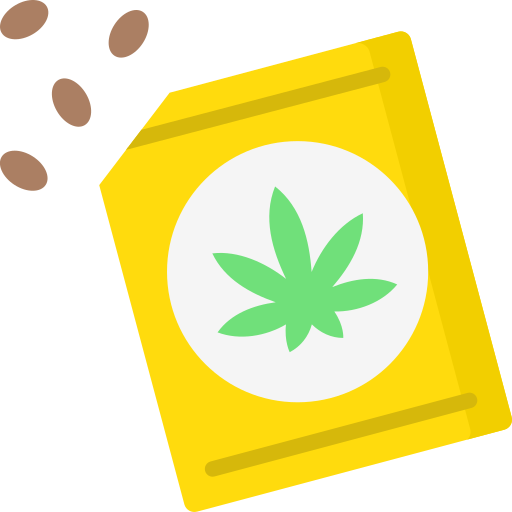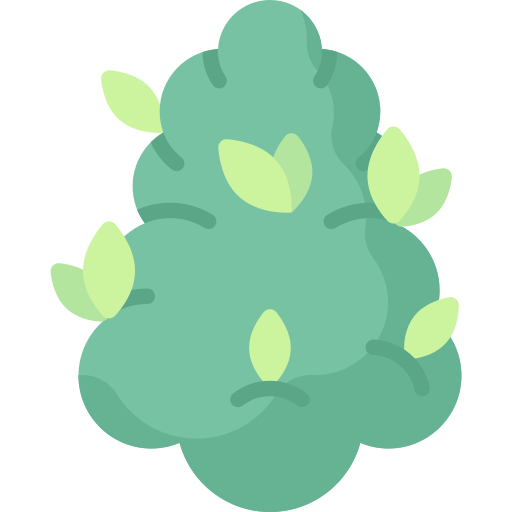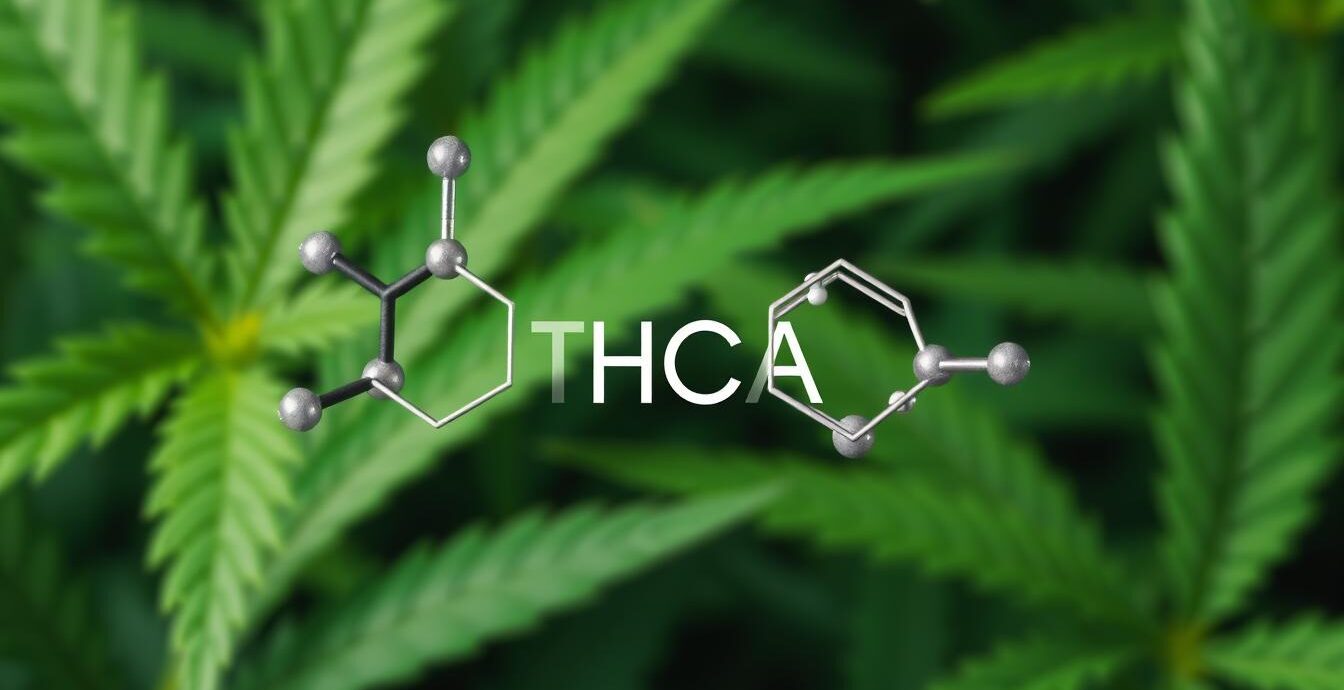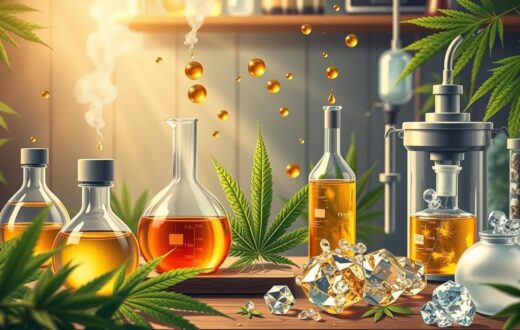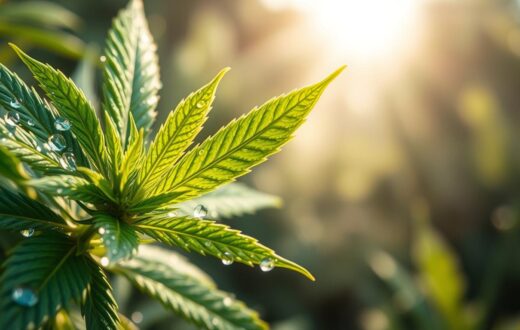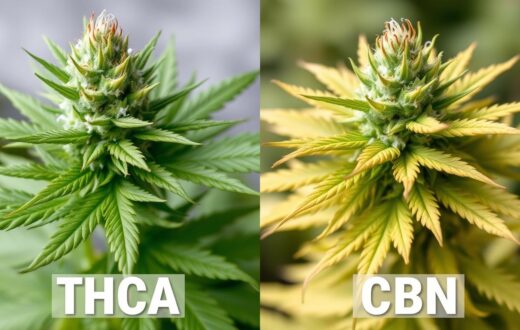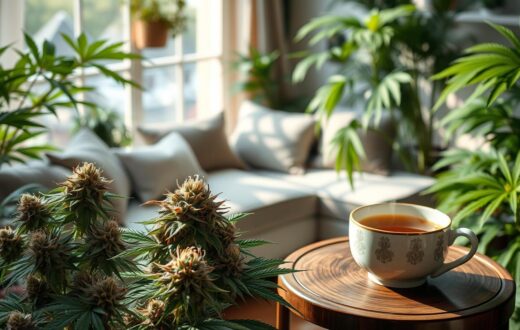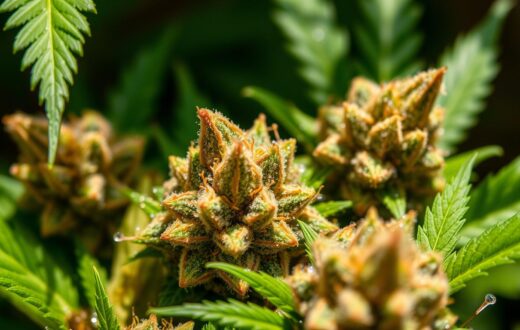Could a non-psychoactive compound from cannabis plants hold the key to unlocking enhanced energy and focus? As we delve into the world of THCA, we’ll explore its potential to revolutionize our approach to natural performance enhancement.
THCA, or tetrahydrocannabinolic acid, is a fascinating cannabinoid found abundantly in fresh cannabis and hemp plants. Unlike its famous cousin THC, THCA doesn’t produce intoxicating effects unless heated. This unique property has sparked interest among researchers and consumers alike, as it offers potential benefits without the high associated with cannabis use.
Recent studies have shown promising results for THCA in various areas. A 2017 study revealed that THCA exhibits potent neuroprotective activity, suggesting it may help maintain cognitive function. Additionally, research indicates that THCA might be more effective than THC in reducing nausea symptoms, making it a potential ally for those seeking natural remedies for discomfort and focus issues.
As we explore THCA’s potential for boosting energy and sharpening focus, it’s important to note that research is ongoing. While early findings are encouraging, more studies are needed to fully understand how THCA interacts with our bodies and minds to potentially enhance performance.
Join us as we unpack the science behind THCA and its possible role in energy enhancement and improved concentration. We’ll examine user experiences, compare THCA to other focus-boosting substances, and provide insights on how to incorporate this intriguing cannabinoid into your daily routine safely and effectively.
Understanding THCA: The Non-Psychoactive Component of Cannabis
Cannabis is made up of many parts, and THCA is one of them. It’s found in raw cannabis plants. Unlike THC, THCA doesn’t make you feel high. This makes it great for those who want cannabis benefits without the high.
What is THCA?
THCA stands for tetrahydrocannabinolic acid. It’s the raw form of THC in live cannabis plants. Unlike THC, THCA doesn’t cause a high unless it’s heated. When you smoke or cook cannabis, THCA turns into THC. This is why raw cannabis won’t get you high, but smoked cannabis will.
THCA vs THC: Key Differences
The main difference between THCA and THC is their effect on the body. THC is known for its psychoactive effects. It’s what makes people feel high when they use cannabis. THCA, on the other hand, is non-psychoactive. It won’t alter your mind or make you feel intoxicated.
Potential Benefits of THCA
THCA might offer health perks without the high. Some studies suggest it could help with inflammation and protect brain cells. It might also ease nausea. These benefits make THCA interesting for medical use. People can get THCA by eating raw cannabis or taking THCA oils. As we learn more, THCA could play a big role in cannabis medicine and even contribute to renewable energy solutions in the future.
The Science Behind THCA and Energy Enhancement
THCA is a non-psychoactive part of cannabis that helps boost energy. It works with our body’s systems in special ways. This could improve our energy and focus.
How THCA Affects the Endocannabinoid System
The endocannabinoid system keeps our body balanced. THCA interacts with it, possibly affecting our energy. It doesn’t make us high, but it might change how our body works.
Neurotransmitters Involved in Energy Levels
THCA might change neurotransmitters that control energy. These brain chemicals are key for staying alert and focused. THCA could naturally increase our energy levels.
Studies show THCA has anti-inflammatory effects and can reduce nausea. These benefits might make us feel better and give us lasting energy. As we learn more, we might find more ways THCA helps our energy.
THCA and Focus: A Natural Alternative
THCA is becoming popular as a natural way to improve focus. It’s different from usual stimulants because it boosts concentration without side effects.
Comparison with Other Focus-Enhancing Substances
People often use caffeine or meds to feel more alert. But these can make you jittery or crash later. THCA, however, helps you stay calm and focused. It doesn’t make you feel high like THC, making it a good choice for natural options.
User Experiences
Many users like THCA for its focus benefits. They say it keeps them alert and productive without feeling overwired. One person said, “I feel more centered and can tackle tasks without getting distracted.” Another mentioned, “It gives me a gentle boost in concentration.”
Even though THCA looks promising, results can differ. Some might not notice much, while others find it very helpful. As research goes on, we’ll learn more about THCA’s effects on focus and brain function. For now, it’s an interesting natural choice for improving mental clarity and productivity.
Potential Benefits of THCA for Energy
THCA is getting more attention in the wellness world. It’s found in raw cannabis and might boost energy and well-being. Let’s see how THCA could change your daily life.
Improved Physical Performance
THCA could help with better physical performance. Some people say it gives them more stamina and less fatigue. It might also help with faster recovery after exercise.
This means you could exercise harder and recover quicker. It’s a great benefit for anyone who loves to stay active.
Enhanced Mental Clarity
THCA also seems to improve mental clarity. Users often feel more focused and alert after using it. This could help with better concentration and less brain fog.
Imagine doing your work with more energy and focus. While more research is needed, these early reports are promising.
It’s important to note that THCA’s effects are different from THC. THCA doesn’t make you high because it’s non-psychoactive without decarboxylation. This makes it a good choice for those looking for energy boosts without feeling intoxicated. As we learn more about THCA, we might find even more ways it can help with physical performance and mental clarity.
How to Consume THCA for Energy Benefits
THCA is a special compound that boosts energy without making you high. It’s a great way to get more energy without the side effects of THC. Let’s look at how you can add it to your daily routine for better energy.
Raw Cannabis and THCA
Raw cannabis is full of THCA. Juicing fresh cannabis leaves keeps THCA in its non-psychoactive form. This way, you can get the energy boost without feeling high.
Some people mix raw cannabis into smoothies or salads. It’s a simple way to get an energy boost.
THCA Oils and Edibles
THCA oils and edibles are easy to use and give you control over how much you take. They’re perfect for those looking for a specific energy boost. THCA oils can be mixed into food or taken under the tongue.
Edibles like gummies or capsules infused with THCA are also great. They’re easy to use and don’t show.
When using THCA for energy, don’t heat it up. This prevents it from turning into THC. The way you take it can affect how fast you feel the energy boost. Start with a small amount and adjust as needed.
Remember, everyone reacts differently to cannabinoids. Find what works best for you.
Research on THCA and Energy Metabolism
Research on THCA is revealing new insights into energy metabolism. Scientists are looking into how this non-psychoactive compound affects our body’s energy production. They’re particularly interested in its potential role in ATP production, the main energy source for cells.
Studies on Cannabinoids and ATP Production
Recent studies indicate that cannabinoids like THCA might impact mitochondrial function. Mitochondria are the cells’ powerhouses, responsible for making ATP. Early research shows interest in how THCA could enhance energy metabolism at a cellular level.
Future Research Directions
The future of THCA research is exciting. Scientists are planning more clinical trials to study its effects on energy levels. They’re also looking into its potential in treating fatigue-related conditions. With the growing interest in green energy, some researchers are exploring how THCA’s energy-boosting properties could inspire new sustainable technologies.
While the current findings are encouraging, more research is needed to fully grasp THCA’s role in energy metabolism. As studies continue, we may discover new ways to use this compound for better health and energy.
THCA vs. Other Cannabinoids in Energy Boosting
Cannabis plants have many cannabinoids, each with special properties. THCA, CBD, and CBG are three that might boost energy. Let’s see how they compare and work together.
Comparing THCA, CBD, and CBG
THCA is a non-psychoactive compound found in fresh cannabis. It doesn’t make you high like THC. CBD is calming, while CBG is energizing. THCA might offer a balance, giving energy without jitters.
Synergistic Effects of Cannabinoids
Cannabinoid synergy is when these compounds work together. This “entourage effect” means combining THCA with CBD or CBG might boost its energy benefits. For instance, THCA’s anti-inflammatory properties could complement CBD’s calming effects, leading to better focus and energy.
As research goes on, we might find new ways to use cannabinoid synergy for energy. This could lead to natural ways to boost productivity and focus. While more studies are needed, the potential of THCA and its cannabinoid cousins is very exciting.
Dosage Guidelines for THCA Consumption
Finding the right thca dosage can be tricky. THCA, the precursor to THC, offers unique benefits without psychoactive effects. We’ll explore dosage recommendations and factors to consider for optimal results.
Recommended Dosage for Energy and Focus
For energy security and mental clarity, start with a low dose of 5-10mg THCA. This range often provides noticeable benefits without overwhelming effects. Remember, THCA converts to THC when heated, so consumption methods matter. Raw cannabis or cold-pressed oils preserve THCA’s properties.
Individual Variability and Considerations
Your ideal THCA dosage depends on factors like body weight, metabolism, and tolerance. Some people feel energized with just 5mg, while others might need 15mg or more. Keep a journal to track your experiences and find your sweet spot. Start low, increase slowly, and pay attention to how you feel. If you have health conditions or take medications, talk to a doctor before trying THCA for energy or focus improvement.
Integrating THCA into Your Daily Routine
Adding THCA to your daily life is easy and rewarding. This natural compound from raw cannabis plants offers benefits without THC’s psychoactive effects. Let’s explore how to make THCA part of your routine.
Suggestions for Incorporating THCA
Start your day with a THCA boost by adding it to your morning coffee. Mix 10-20 mg of THCA powder into your brew for a balanced experience. This combo can promote energy and calmness, giving you a clear-headed start. Remember, THCA products come in various forms, so choose one that fits your lifestyle.
Timing: When to Use THCA
Timing is key in your THCA routine. Many find morning use ideal for an energetic day ahead. Others prefer mid-day doses to fight afternoon slumps. Experiment to find what works best for you. Unlike edibles that can take an hour to kick in, vaping THCA offers almost immediate effects. This clean technology allows for precise timing in your daily integration.
Quality matters in your THCA routine. Opt for trusted brands like Magic City Organics for reliable products. Start with low doses and increase gradually. Pay attention to how your body responds and adjust your routine accordingly. With careful planning, THCA can become a valuable part of your daily wellness practice.
Safety and Side Effects of THCA
THCA safety is a big deal for those trying it out. It has benefits but knowing its effects is key. Studies show it might help with nausea, inflammation, and brain diseases.
A 2011 study found THCA could reduce inflammation by stopping prostaglandin production.
General Safety Profile
THCA is seen as safe because it doesn’t get you high. It’s different from THC because it doesn’t make you feel intoxicated. But, it can turn into THC when heated, which might make you feel high.
Possible Side Effects to Watch For
THCA is usually safe, but some side effects can happen. You might feel anxious, sleepy, or hungry. Rarely, it could cause nausea or skin problems.
It’s also important to know that THCA can show up in drug tests because it can turn into THC in your body.
Always talk to a doctor before trying THCA, especially if you’re on meds or have health issues. The long-term effects of THCA are still being looked into. This highlights the need for careful use and more research in this area.
Legal Status of THCA in the United States
THCA legality in the US is complex. The Controlled Substances Act lists THCA as a Schedule I substance. But, hemp-derived THCA with less than 0.3% THC is not controlled under federal law. This creates a gray area in cannabis laws across the country.
Overview of State Laws
State regulations on THCA vary widely. California, Oregon, Colorado, and New York allow THCA products with less than 0.3% Delta-9 THC. Idaho only permits THCA with no detectable THC, while Kansas bans all THC-containing products. These differences highlight the need for consumers to research local laws before purchasing THCA products.
Federal Regulations
Federal law is unclear on THCA. The DEA struggles to define THCA laws clearly. Congress requires testing of delta-9 THC concentration after decarboxylation to define hemp. This creates confusion for businesses and consumers. The House Committee on Agriculture has proposed banning intoxicating hemp-derived cannabinoids, which could affect THCA products.
The legal landscape for THCA is evolving. Recent incidents, like the 2023 raid on a hemp dispensary in Texas, show ongoing confusion in the industry. As lawmakers consider reclassifying cannabis, the future of THCA regulation remains uncertain. Consumers and businesses must stay informed about changing laws to navigate this complex legal environment.
Getting Quality THCA Products
When looking for top-quality thca products, knowing what to search for is key. Quality assurance is crucial in this growing market. Trusted brands have become leaders in offering reliable options.
Trusted Brands and Sources
Many reputable companies offer high-quality THCA flowers and products. Area 52 is known for their THCA Exotic Flower, with an impressive 35% THCA content. Finest Labs offers strains like Singapore Sling, with about 25% THCA concentration.
Best Buds and Arete Hemp provide organic options with THCA levels from 20% to 35%.
Signs of Quality THCA Products
To ensure you’re getting premium thca products, look for up-to-date Certificates of Analysis (COA). These documents verify potency and purity. Quality products usually have THCA content between 18% and 26%.
Reputable brands like Creating Better Days focus on premium hemp sourcing and extensive testing. They offer various product categories, including Energy & Focus and Relaxation.
Customer reviews are important in evaluating vendors. High satisfaction ratings often mean quality products. Remember, THCA is non-psychoactive in its raw form, unlike THC. This makes it an interesting option for those seeking benefits without the high.
As the industry grows, we may see THCA used in new ways, even in biofuels.
Conclusion: The Future of THCA in Energy and Focus Enhancement
Looking ahead, THCA is set to play a big role in boosting energy and focus. This part of raw cannabis is getting attention for its benefits without the high. It’s a clean technology that could change how we think about energy.
Summary of Key Points
THCA is a new way to get more energy and stay focused. It doesn’t make you high like THC because it doesn’t act on certain brain receptors. Studies also show it might help fight inflammation and protect the brain, making it useful for health.
Final Thoughts on THCA and Performance Improvement
THCA’s future in improving performance is looking good. More research will likely lead to products that boost energy and clear the mind. With Florida’s growing medical marijuana scene, we might see even more uses for THCA.
But we need to be careful and informed about using THCA. As we learn more, we’ll figure out the best ways to use it for better energy and focus. The future of THCA is promising, and it could change how we use natural energy boosters.
